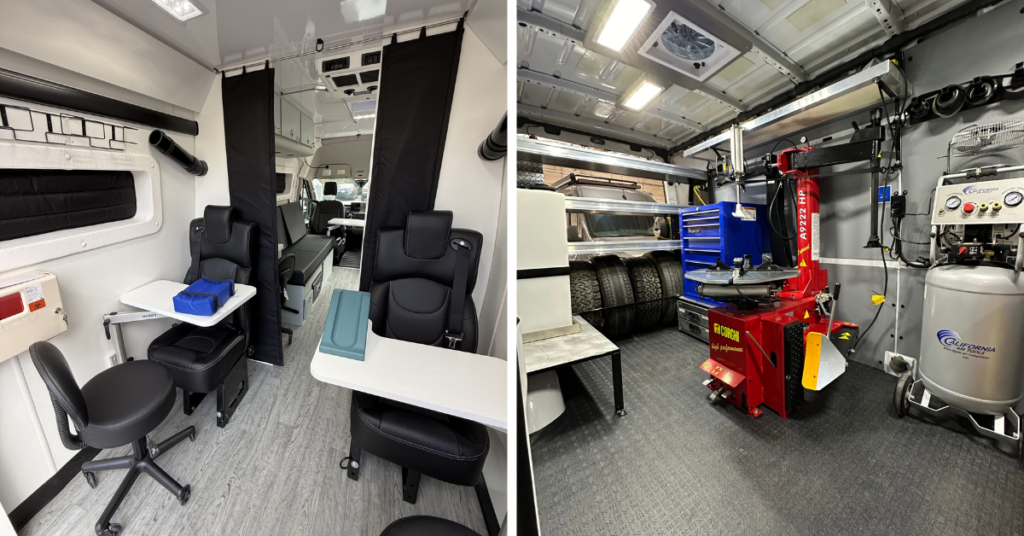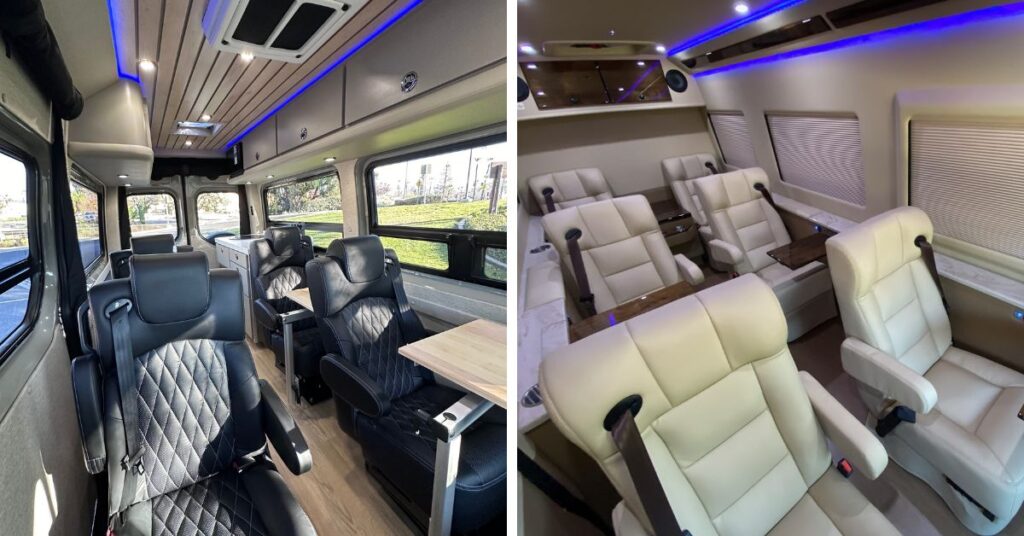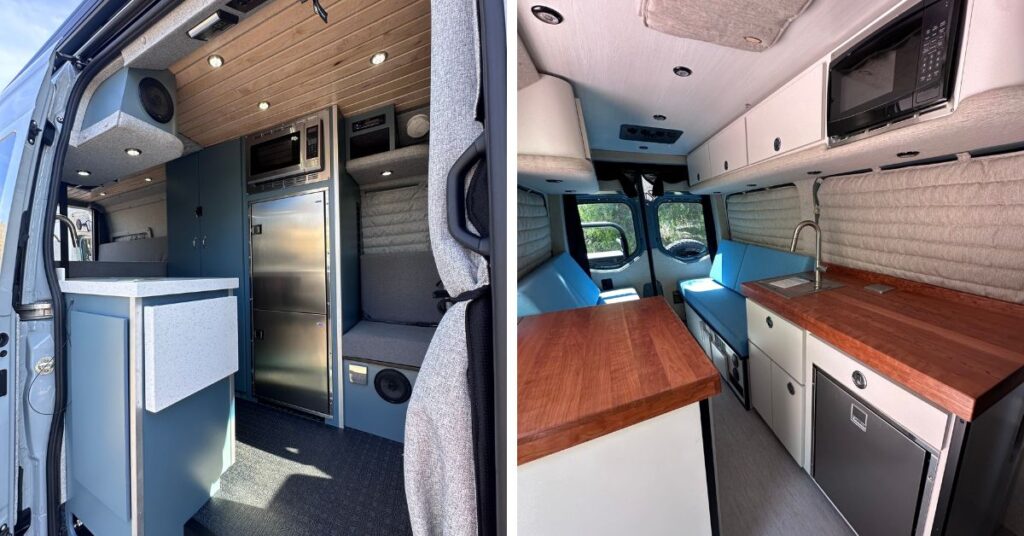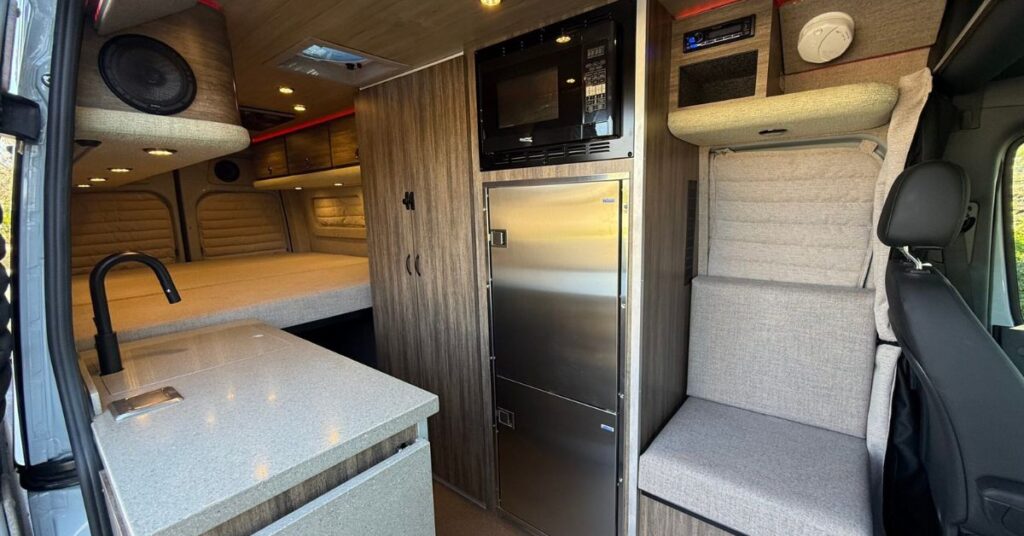Van conversion vs a campervan – is there a difference? Absolutely. In fact, understanding the differences between a conversion van vs camper van can make your search a lot easier when you’re browsing YouTube videos, exploring layouts on Pinterest, or Googling features to add to your dream build.
While the terms get thrown around interchangeably, they actually serve very different purposes. A camper van is a type of van conversion, but not every converted van is a camper. In this blog, we’ll break down the key differences between a camper van vs conversion van, helping you decide which one best fits your lifestyle, travel plans, and budget.
What Is a Conversion Van?
A conversion van starts as a standard cargo or passenger van and is modified to serve a new purpose. These builds can range from simple upgrades to completely custom interiors.
Common Uses for a Conversion Van:
Shuttle or corporate transport: Think about airport shuttles, winery tours, or Hollywood production vans moving cast and crew. These vans are customized for passenger comfort and high-capacity seating.
Mobile office setups: Great for freelancers, sales reps, and executives, these van conversions are designed for productivity on the go. You’ll often find premium seating, fold-out desks, blackout shades, temperature control, Wi-Fi, and built-in monitors.
Mobile businesses: From mobile coffee shops and grooming salons to dentists and veterinarians, many small businesses use converted vans to take their services on the road. These vans are often tailored specifically to meet business needs and bring services directly to customers.

Family travel and road trips: Families that outgrow traditional minivans often turn to full-sized conversion vans for extra space and comfort. With room for extra seats, coolers, storage space, and gear, these builds make long trips easier and more enjoyable.
Wheelchair-accessible transportation: Mobility-focused van conversions include UVL lifts, secure wheelchair tie-downs, grab bars, and lowered flooring to improve safety and accessibility.
Adventure vans: Not quite a camper, but close. Adventure vans are often Mercedes Sprinter builds with 4×4 or AWD, roof racks, and custom interiors for mountain biking, snowboarding, or off-road exploration. These may include a bed platform, small galley kitchen, and solar, but they’re primarily built around the user’s hobbies.
Common Features of a Conversion Van:
- High-top roof for extra headroom
- Comfortable or custom seating arrangements
- Built-in storage space for luggage or equipment
- Insulation and upgraded interior paneling
- Entertainment systems (screens, speakers, DVD players)
- Optional sleeping areas or platforms
Generally speaking, a conversion van offers flexibility and comfort but isn’t always equipped for full-time living or extended off-grid stays. These are perfect if you want a vehicle that provides convenience and functionality but don’t necessarily need a built-in kitchen or bathroom.

What Is a Camper Van?
A camper van is a specialized van conversion built for living. It’s a compact and self-contained living space that blends the drivability of a van with many of the amenities found in RVs. Some are classified as Class B RVs, and while smaller than Class A or C motorhomes, they offer serious versatility.
Common Uses for a Camper Van:
Weekend camping getaways: You’ve probably seen camper vans parked at national parks or scenic campsites. They’re perfect for spontaneous weekend trips or short stays in nature. They make it easy to show up, park in a normal parking spot, and start relaxing.
Off-grid adventures: Many camper vans are built for remote travel. Think solar panels, lithium batteries, large water tanks, and propane cooking. They’re perfect for exploring BLM land and off-grid camping where hookups aren’t available.
Long-term travel: These vans are ideal for those planning a cross-country trip or exploring several states at a time. Compared to a basic road trip van conversion, a camper van will have more built-in features that make longer stays more realistic.
Full-time van life: Some people go all in. Known as “vanlifers,” these folks use their converted van as a permanent home. These builds are carefully designed to balance comfort, functionality, and independence.

Common Features of a Camper Van:
- Fixed or convertible bed
- Kitchenette with stove, sink, and fridge
- Water system with fresh and gray tanks
- Cabinetry and storage for food, clothes, and gear
- Solar panels and deep-cycle battery bank
- Portable or built-in toilet (sometimes even a full wet bath)
- Heating and cooling for all-season travel
A true camper van is optimized for independent travel. Unlike a general van conversion, it includes everything needed for extended trips away from civilization. Whether you’re staying at campgrounds, boondocking in the desert, or parked at a beach, camper vans make it possible to bring the comforts of home on the road.
Camper Van vs Conversion Van: Key Differences
FeatureConversion VanCamper VanPrimary UseTravel, business, or daily transportCamping, off-grid, or full-time van lifeSleeping SetupOptional or removableBuilt-in bed or platformKitchen FacilitiesRareCommon (sink, stove, fridge)Water SystemRareYes (clean and gray tanks)Bathroom/ShowerUncommonOften included or optionalPower SystemBasic outlets or noneSolar with battery backupStorage SpaceGear, luggage, or toolsMulti-use cabinetry and under-bed storageCustomization FocusComfort and transportSelf-sufficiency and full-time functionalityPrice RangeMore affordableCan be more expensive, depending on buil
Which One Is Right for You?
Buy a Conversion Van If:
You’re looking for a versatile vehicle that blends comfort, transport, and utility without the need for full-time living features. A conversion van is ideal if your focus is on daily use, business travel, or road trips that don’t require a built-in kitchen or bathroom.
- You need a vehicle for transporting people or gear
- You want an upgraded daily driver or travel van
- You plan to work or run a business on the road
- You don’t need built-in living space or amenities
- You’re on a tighter budget and want flexibility
Buy a Camper Van If:
You want the freedom to travel and live on the road with everything you need built into one compact space. A camper van is perfect for those craving adventure, self-sufficiency, and the ability to sleep, cook, and explore wherever the road takes them.
- You want to sleep in your van regularly
- You enjoy off-grid camping or national park trips
- You want to travel full-time or for extended periods
- You’re looking for a Class B RV alternative
- You want a self-contained living space with storage, power, and water

Final Thoughts
When it comes to camper van vs conversion van, the right choice depends on your needs, goals, and travel style. A conversion van is all about comfort, mobility, and multi-use functionality. It’s perfect for transporting passengers, working on the go, or running a business.
A camper van, on the other hand, is your tiny home on wheels. It’s designed for living, whether that means weekend trips or the full-time van life lifestyle. You’ll pay more upfront, but you might save money in the long run by skipping hotels and eating in your van’s kitchen.
Whether you’re eyeing a Sprinter van for off-road adventures or looking to buy a conversion for your next business idea, understanding the core differences helps you make a smarter investment. And when you’re watching build videos, researching layouts, or choosing a conversion company to work with, you’ll be far better equipped to find exactly what you’re looking for.
Start by deciding what matters most: mobility, comfort, utility, or total independence. From there, the right van will start to take shape.



